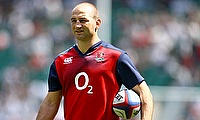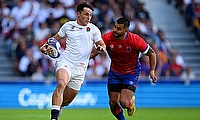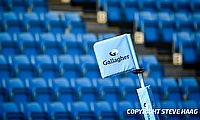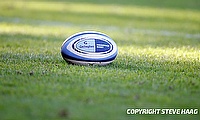Courtney Lawes, England's X-Factor
Courtney Lawes has established himself as the best defensive lock in world rugby over the last few years and deserves to be in the conversation as one of the very best at his position.
If you’ve stuck with us beyond that statement, please bear with us a little longer and see our reasoning for such a bold proclamation.
Injury ruled Lawes out of England’s opening three games of the Six Nations, but the impact he had on improving England’s forward play was more than evident in his return against Scotland. He followed that up with another virtuoso display against France, relentlessly imposing his physicality on Les Bleus. Just ask Jules Plisson.
England missed the enforcing duties that Lawes, with such aplomb, performs, and the physical edge that he brought to the England pack was not only a welcome sight, but also the first facet of a skill set that makes him one of the most important men in that squad.
Lawes is England’s enforcer. It’s a role which some teams have phased out in recent years, but there’s no doubt that having a player that can instil a level of fear into the opposition is a valuable weapon to have. There are almost no locks who tackle as ferociously as Lawes, with South Africa’s Eben Etzebeth perhaps the most comparable, whilst Ireland’s Iain Henderson is making up ground on the pair.
The athleticism which contributes so greatly to the power of Lawes’ tackling is also helping him forge a name for himself as one of the more industrious second rows in international rugby. His mobility sees him frequently amongst England’s top tacklers, whilst his work at the breakdown is underrated, particularly for a man of his height. Charging down kicks and pressuring fly-halves, talents which not many second rows exhibit, are two more strings to Lawes’ bow.
As excellent as Lawes is at these facets of the game, the tackling, work rate and enforcing are all secondary to an even more important defensive attribute – his impact at the lineout.
Over the last couple of seasons, Lawes has developed into arguably the best stealer of opposition lineout ball in the northern hemisphere, if not the world. This comes down to a combination of great rugby understanding and once again, impressive athleticism.
In the world of the NFL, player’s with large wingspans and significant jumping ability (vertical) are highly coveted, but in rugby they are elements that are rarely talked about, let alone considered as precursors for greatness within the sport. Lawes’ defensive work at the set-piece is a perfect example of why these two physical assets will begin to grow in importance to rugby, at both club and international level.
Everything mentioned so far is a compelling manifesto for Lawes’ coronation as the defensive standout at his position, but there is no shortage of competitors. The aforementioned Etzebeth and the Kiwi duo of Sam Whitelock and Brodie Retallick are amongst the most skilled at the position, whilst Alun Wyn Jones and Paul O’Connell also make compelling cases in the northern hemisphere.
That said, as gifted as all these players are, it’s a tall order to say that they contribute as much defensively as Lawes does, although expect impassioned arguments from their fellow countrymen.
This is not to say Lawes is the best second row in international rugby. In fact, if that claim were to be made, expect full on revolt in Retallick’s native New Zealand, as the big lock was the IRB Player of the Year award winner in 2014. The Kiwi currently offers more offensively than the Northampton Saint, and this is an area of his game that Lawes needs to continue to polish.
At times Lawes carries too vertically, which although great for releasing his hands for offloads, does prevent him from busting through tackles and bringing about bigger gains. If Joe Launchbury returns to the England XV, presumably replacing Geoff Parling, then there is also an opportunity for Lawes to develop as a lineout caller, something which would give him an advantage over Retallick, with New Zealand often relying on Whitelock or Victor Vito for those duties.
If Lawes can develop his offensive skills and get them to match his defensive impact, not only will he be in the conversation for best at his position, but also for best in the world full stop.
With England’s defensive travails of late, Lawes could well be their most important player heading into the 2015 Rugby World Cup, as he has the rare ability in rugby of being able to completely change the momentum of the game without the ball in his hand.
The stage is set for Lawes to prove our earlier proclamation right later this year and it would take a brave (or foolish) man to stand in his way.








